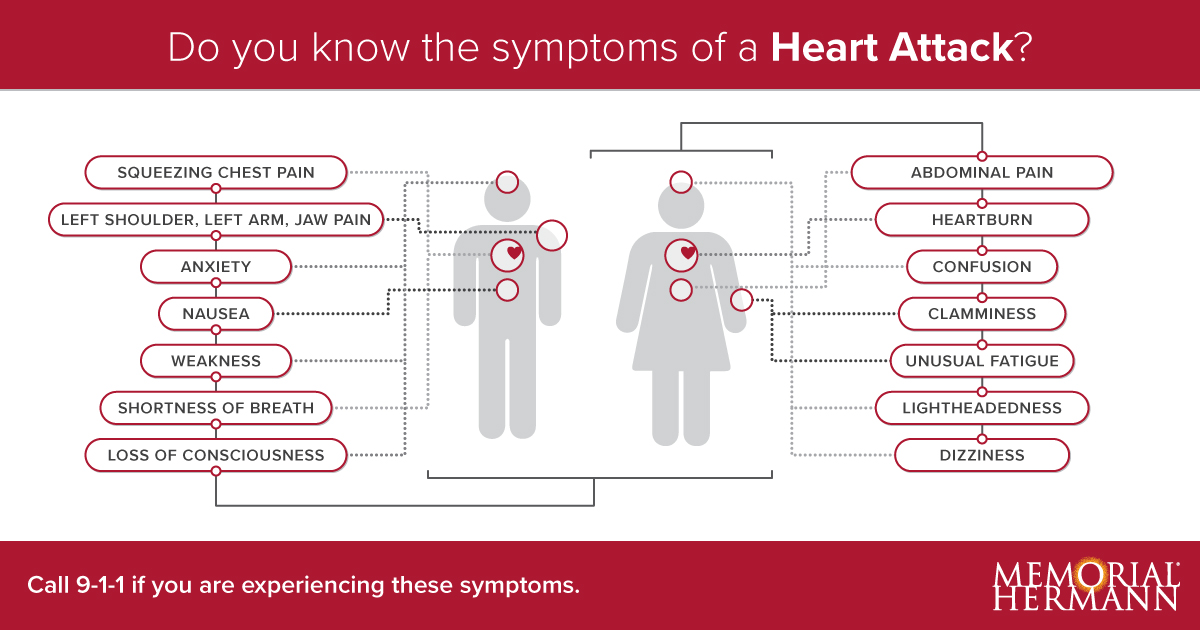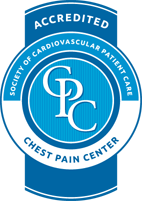What Is a Heart Attack?
A heart attack (also called a myocardial infarction) is a medical emergency, requiring immediate medical attention. A heart attack occurs when an artery supplying blood to the heart is blocked. Without blood flow, the heart muscle is starved of oxygen and the tissue loses oxygen and dies. The damage worsens the longer the artery stays blocked.
Heart Attack Versus Angina
An angina attack is not a heart attack. In angina, the heart does not get enough oxygen for a short time. The pain or discomfort – in the chest, arms, shoulders, back, neck or jaw – often goes away with rest or nitroglycerin. Angina does not usually cause lasting damage to the heart.
Heart Attack and Sudden Cardiac Arrest
A heart attack can cause sudden cardiac arrest. As a result of the interruption in blood flow to the heart muscle, the heart may go into an abnormal rhythm or stop beating completely. When the heart fails to beat, blood flow to the brain and other vital organs is disrupted. Without immediate CPR and emergency medical attention, cardiac arrest can be fatal.
Causes and Risk Factors of Heart Attack
Causes of Heart Attack
Coronary artery disease is the major underlying cause of heart attacks.
Most heart attacks are caused by a blood clot that blocks one of the coronary arteries. A clot most often forms in a coronary artery that has become narrow because of the build-up of plaque along the artery walls. The plaque can crack and trigger formation of a blood clot. Other common causes of heart attack include:
- Thickening of the walls of the arteries feeding the heart muscle (coronary arteries)
- Narrowing of the coronary arteries
- Spasm of the coronary arteries
Heart Attack Risk Factors
Risk factors that may increase your chance of developing a heart attack, including:
- Being male
- Increased age
- Obesity
- Smoking
- High blood pressure
- Sedentary lifestyle
- High blood cholesterol - specifically, high LDL cholesterol (bad cholesterol), and low HDL cholesterol (good cholesterol)
- High blood triglycerides
- Diabetes
- Stress
- Family members with heart disease
Symptoms of a Heart Attack

Symptoms of a Heart Attack Can Include:
- Squeezing, heavy chest pain, especially with:
- Exercise or exertion
- Emotional stress
- Cold weather
- A large meal
- Pain in the left shoulder, left arm, or jaw
- Shortness of breath
- Sweating, clammy skin
- Nausea
- Weakness
- Loss of consciousness
- Anxiety, especially feeling a sense of doom or panic without apparent reason; may not be able to sit still for very long
Heart Attack Symptoms in Women
Heart attack symptoms in women may differ or be less noticeable than those in men. In addition to the symptoms above, women may also experience:
- Abdominal pain or heartburn
- Back and shoulder pain
- Confusion
- Clamminess
- Unusual fatigue
- Lightheadedness or dizziness
Heart Attack Versus Stroke with Dr. Avendaño
Heart Attack Diagnosis
Tests for heart attack may include:
- Blood tests - to look for certain chemicals found in the blood within hours or days after a heart attack
- Urine tests - to look for certain items found in the urine within hours or days after a heart attack
- Electrocardiogram (EKG) - records the heart's rate and rhythm. Damage to the heart may cause the beat to be too fast, too slow, or very irregular
- Echocardiogram - uses high-frequency sound waves (ultrasound) to examine the size, shape, function, and motion of the heart
- Stress test - records the heartbeat under increased physical stress, usually done days or weeks after the heart attack
- Nuclear scanning - uses radioactive material to show areas of the heart muscle where there is limited or no blood flow
- Electron-beam computed tomography (EBCT) - a type of X-ray that uses a computer to make detailed pictures of the heart, coronary arteries, and other surrounding structures
- Coronary angiography - uses dye and X-rays to look for narrowing or blockage in the coronary arteries
Treatment for Heart Attack
If you or someone you know experiences chest discomfort, particularly with one or more of the other symptoms, call 911 right away.
From the moment a blood clot forms and a patient experiences the first symptom of a heart attack, a race against time begins.
With each minute that passes, the heart muscle is progressively damaged and the patient’s condition worsens. While the damage cannot be reversed, it can be reduced through the quick restoration of blood flow.
Because every minute matters, specialists in cardiovascular care at Memorial Hermann review every aspect of the treatment process - from patient arrival (door) to the start of treatment (balloon). With this process, Memorial Hermann hospitals have a time-to-treatment far ahead of the national average.
The emphasis on quality improvement has led to numerous advances in the management of heart attack, including:
- An average time to first electrocardiogram of 6.2 minutes, consistent with the national goal of 10 minutes or less
- Development and implementation of ECG transmission from the field
- Tiered emergency response to dispatch more highly trained paramedics, rather than EMTs, to respond to cardiac emergencies, such as cardiac arrest
- Implementation of a paramedic squad to respond to high-volume areas of the metro area
Door-to-Balloon
The American College of Cardiology and the American Heart Association have developed national guidelines calling for a door-to-balloon time of less than 90 minutes for hospitals that offer direct angioplasty.
What is "Door-to-Balloon?"
One of the most effective treatments for a heart attack is angioplasty, a procedure during which a small balloon is inflated to open blocked arteries. The time from when a patient enters the emergency room until the angioplasty balloon is inserted is critical. The lower the "door-to-balloon" time, the better the patient's outcome.
Memorial Hermann Chest Pain Centers
Memorial Hermann's hospitals have accredited Chest Pain Centers, as designated by the Society of Chest Pain Centers.
What is an Accredited Chest Pain Center?

Accredited Chest Pain Centers undergo a rigorous evaluation process by the SCPC based on their ability to assess, diagnose, and treat patients quickly and effectively, clinical outcome statistics and comparisons nationwide. Currently there are less than 400 accredited chest pain centers, only representing 10% of United States hospitals.
Shortening Time to Treatment for Heart Attack Patients
Working in partnership with EMS, emergency physicians, cardiologists and critical care nurses, a Chest Pain Center's goal is to shorten the time from a patient's initial cardiac symptoms to treatment.
Patient Outcomes
Accredited Chest Pain Centers have been found to reduce the mortality rates of patients suffering from chest pain through a very specific protocol-driven and systematic approach which allows physicians to:
- Treat patients more quickly during the critical early stages of heart attack, when treatments are most effective
- Better monitor patients when it's not clear whether they are having a coronary event, which ensures that patients are not sent home too early or needlessly admitted
Contact Us
Please fill out the fields below and we will contact you, or call (713) 222-2273 for more information.
Healthy Living
A healthy heart begins with healthy habits. Create balance and take charge of your heart health today.
Nutrition
Eat smarter with heart healthy eating tips and recipes. Learn to cut sugars, eat clean and more.
Fitness
Get moving with this guide to heart healthy fitness! Learn how exercise improves your heart health.